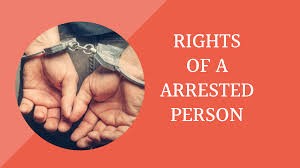The right to life and personal liberty is a fundamental human right enjoyed by all, regardless of identity or status. This principle remains inviolable, even for individuals accused of serious crimes. According to Article 1 of the Universal Declaration of Human Rights (UDHR), “All human beings are born free and equal in dignity and rights and are endowed with reason and conscience and should act towards one another in the spirit of common brotherhood.” These principles are enshrined in our Constitution, ensuring that every individual is “innocent until proven guilty,” which imposes constraints on police powers of arrest to ensure fair trials.
Right to Know the Reasons for Arrest-
Section 50(1) of the Cr.P.C. mandates that any person arrested without a warrant must be informed of the reasons for their arrest. This is a fundamental right also protected by the Indian Constitution under Article 22(2), which requires that anyone arrested must be informed promptly of the grounds of their arrest.
Right to be Produced Before a Magistrate Without Delay-
Section 55 of the Cr.P.C. specifies that individuals arrested without a warrant must be brought before a magistrate promptly. Further, Section 76 states this must occur within 24 hours of the arrest. This ensures adherence to the constitutional right under Article 21, protecting individuals from arbitrary detention.
Despite these clear legal stipulations, violations occur. It is imperative for magistrates to verify that the rights of the arrested person have been respected during the arrest process. Magistrates must ensure that the grounds for arrest are documented and valid, enabling judicial review and correction of any wrongful actions by the police.
Right to be Released on Bail
According to Section 50(2) of the Cr.P.C., an individual arrested without a warrant for a non-cognizable offense must be informed of their right to be released on bail. The police are also responsible for making arrangements for sureties on the individual’s behalf.
Right to Consult a Lawyer
Article 22 of the Indian Constitution, along with Sections 41(d) and 303 of the Cr.P.C., guarantees the right of the arrested person to consult a lawyer of their choice at the earliest opportunity. The Supreme Court, in Directorate of Revenue Intelligence vs. Jugal Kishore Samra ((2011) 12 SCC 362), ruled that such consultations may occur in the presence of a police officer, but not within their hearing.
Right to Free Legal Aid
Section 304 of the Cr.P.C. ensures that if an accused person cannot afford legal representation during a trial, the court must appoint a defense lawyer at the state’s expense. Article 39A of the Constitution further reinforces this right, ensuring indigent individuals have access to legal aid without having to request it.
Right to Remain Silent
Article 20(3) of the Indian Constitution protects individuals from self-incrimination, stating that no person can be compelled to be a witness against themselves. This was affirmed in the case of Nandini Satpathy vs. P L Dani, where the court ruled that an accused has the right to remain silent during interrogation.
While an advocate cannot be present during interrogation, prior consultation is permitted, allowing the accused to be informed of their rights and preventing abuse. If the advocate’s advisory role is not maintained, a magistrate can prohibit their presence during interrogation to prevent disruptions.
Right to Medical Examination
Section 54 of the Cr.P.C. allows for a medical examination of the accused if it could disprove their involvement in an offense or indicate abuse. The court can order such an examination if it is deemed necessary for justice.
The Way Forward
To further protect the rights of the accused, provisions such as allowing complainants to withdraw complaints before final orders are passed could be beneficial. Additionally, magistrates could be empowered to acquit the accused if complainants fail to appear without reasonable cause.
For non-bailable offenses, the inability to pay bail due to indigence should be grounds for reducing or waiving bail amounts. Alternatives to monetary bail, such as conditional release involving community service, drug rehabilitation, or counseling, should be considered. These measures, recommended in the 1973 expert committee report “Procedural Justice to the People,” could be applied in cases involving first-time offenders, minor offenses, or individuals with financial constraints.
Preserving human rights is essential, but often neglected by authorities. Despite guidelines in the Cr.P.C. and judicial rulings, violations such as custodial deaths persist, undermining the right to life and liberty. Therefore, it is crucial to enforce these laws rigorously and hold authorities accountable for misconduct to ensure the protection of the accused’s rights.
-Laksh Verma (Trainee)

